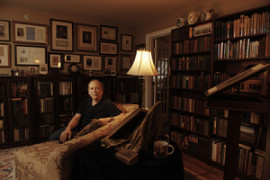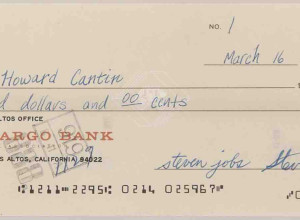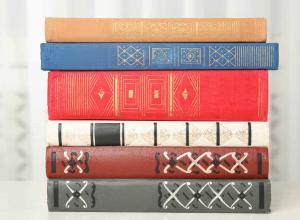December 22, 2009 |
F. Scott Speaks!
Thanks to book tours, readers have many chances to hear favorite authors read from their own work, and most writers do so admirably. (David Sedaris has made his reading appearances into a well-deserved little side-business.)
Writers now know how to read in public simply because the practice has become so commonplace. Reading from one's own work requires a minor subset of the same skills required for acting: a pleasant voice, a sense of timing, and the ability to make the same words that have been read in bookstores across the country for the last six weeks sound as if the writer had just scribed them.
The ritual of the book tour is a fairly contemporary development in the promotion of books. True, Charles Dickens was the authorial equivalent of Jenny Lind when it came to making money from American tours. But how many long-dead authors would have had the chops to read from their own works before, say, 1971, when Leonard Riggio turned Barnes and Noble into what would eventually become, to authors, "the vaudeville circuit?"
I became fascinated by the quest to hear the voices of favorite, but long-deceased, authors when I was hard at work many years ago writing a play about Scott Fitzgerald. Do not get excited, because the work was never finished, but I took great enjoyment in the many writer's blocks I encountered. Writers know that there are only two endeavors more fun than actually writing: collecting royalties and doing research.
And so, every time I hit a stumbling point, I would convince myself that I was still being productive if I did more research. And that is how I found myself at the Princeton Library Rare Books collection.
Writers now know how to read in public simply because the practice has become so commonplace. Reading from one's own work requires a minor subset of the same skills required for acting: a pleasant voice, a sense of timing, and the ability to make the same words that have been read in bookstores across the country for the last six weeks sound as if the writer had just scribed them.
The ritual of the book tour is a fairly contemporary development in the promotion of books. True, Charles Dickens was the authorial equivalent of Jenny Lind when it came to making money from American tours. But how many long-dead authors would have had the chops to read from their own works before, say, 1971, when Leonard Riggio turned Barnes and Noble into what would eventually become, to authors, "the vaudeville circuit?"
I became fascinated by the quest to hear the voices of favorite, but long-deceased, authors when I was hard at work many years ago writing a play about Scott Fitzgerald. Do not get excited, because the work was never finished, but I took great enjoyment in the many writer's blocks I encountered. Writers know that there are only two endeavors more fun than actually writing: collecting royalties and doing research.
And so, every time I hit a stumbling point, I would convince myself that I was still being productive if I did more research. And that is how I found myself at the Princeton Library Rare Books collection.
I became convinced that one of the writing blocks I was having
would be cured if I could simply hear what F. Scott Fitzgerald's voice
sounded like. (It's not a totally irrelevant research question: if
you're writing a play in which one of the main characters is Scott
Fitzgerald, you'd better have a pretty good idea of what his vocal
cadences were.) And so I drove to Princeton and after proving my bona
fides to the librarian, I was permitted to listen to a recording of
Scott Fitzgerald reading a selection from John Masefield's poem "On
Growing Old."
Fitzgerald hailed from St. Paul, Minnesota, which speaks a dialect of mid-Western American English known as "General American" and is remarkable for its lack of novelty. It has none of the sing-song of Minn-e-SO-ta, nor the wood-chippery cadences of the movie "Fargo."
But Fitzgerald and his wife, Zelda, epitomized the Roaring 20s. I hoped his education at Princeton and his subsequent success in the Big City had given him a voice of acquired nobility.
Unfortunately, it had. He read Masefield's poem with a cadence which is a cross between a high-school English teacher and an out-of-work matinee idol. Each line is read with the five-beat rhythm of a jack-in-the-box's laugh: "HA-ha-ha-ha-ha. HA-ha-ha-ha-ha." There was no attempt to transmit truth, merely the mimicry of what "a person who reads poetry sounds like." (If you must, you may listen to the three known recordings of F. Scott Fitzgerald's voice here.)
It took some time for me to regain my ground. I made the mistake of re-reading the end of "The Great Gatsby" as if Fitzgerald himself might have read it:
And then I realized the great truth that most of you have known even before you even read this post: the tool of the writer is not the spoken voice, but the keyboard. We, the reader, not the writer, create the voices of our favorite writers in our heads.
And if they did not have to go out on the road to sell those damn books, most of them would thank you kindly if you would keep it that way.
Fitzgerald hailed from St. Paul, Minnesota, which speaks a dialect of mid-Western American English known as "General American" and is remarkable for its lack of novelty. It has none of the sing-song of Minn-e-SO-ta, nor the wood-chippery cadences of the movie "Fargo."
But Fitzgerald and his wife, Zelda, epitomized the Roaring 20s. I hoped his education at Princeton and his subsequent success in the Big City had given him a voice of acquired nobility.
Unfortunately, it had. He read Masefield's poem with a cadence which is a cross between a high-school English teacher and an out-of-work matinee idol. Each line is read with the five-beat rhythm of a jack-in-the-box's laugh: "HA-ha-ha-ha-ha. HA-ha-ha-ha-ha." There was no attempt to transmit truth, merely the mimicry of what "a person who reads poetry sounds like." (If you must, you may listen to the three known recordings of F. Scott Fitzgerald's voice here.)
It took some time for me to regain my ground. I made the mistake of re-reading the end of "The Great Gatsby" as if Fitzgerald himself might have read it:
Gatsby believed in the green light, the orgastic future that year by year recedes before us. It eluded us then, but that's no matter --- to-morrow we will run faster, stretch out our arms farther. . . . And one fine morning ---That experiment almost ruined by appreciation of what I consider to be the finest two paragraphs of American literature ever written.
So we beat on, boats against the current, borne back ceaselessly into the past.
And then I realized the great truth that most of you have known even before you even read this post: the tool of the writer is not the spoken voice, but the keyboard. We, the reader, not the writer, create the voices of our favorite writers in our heads.
And if they did not have to go out on the road to sell those damn books, most of them would thank you kindly if you would keep it that way.
















